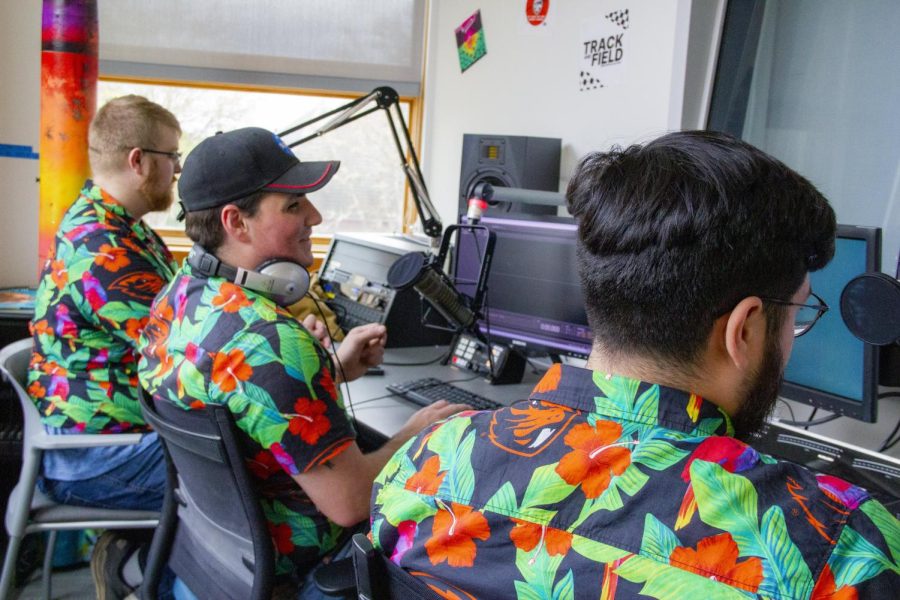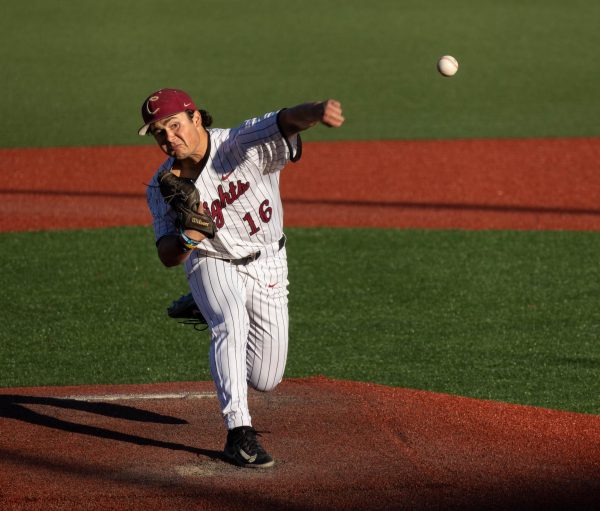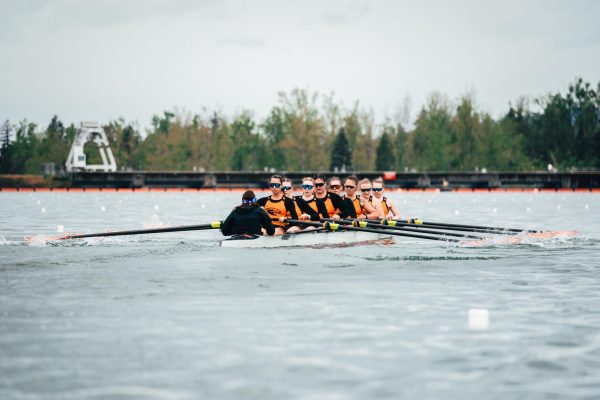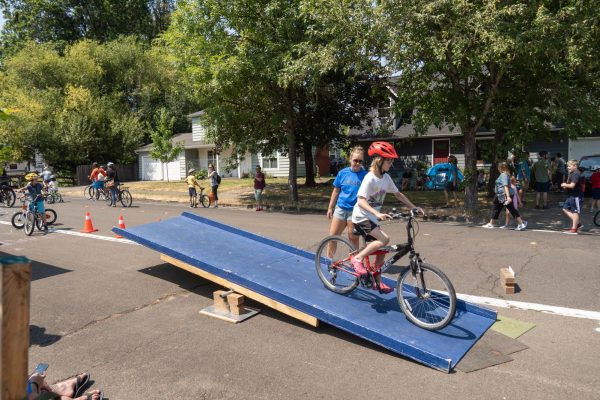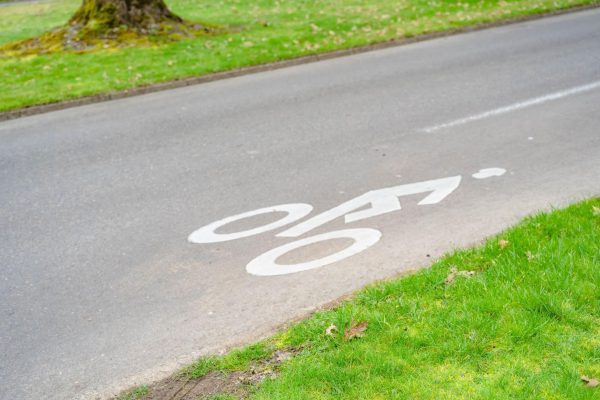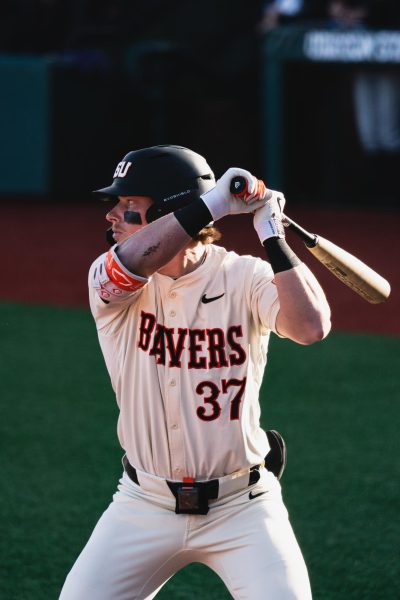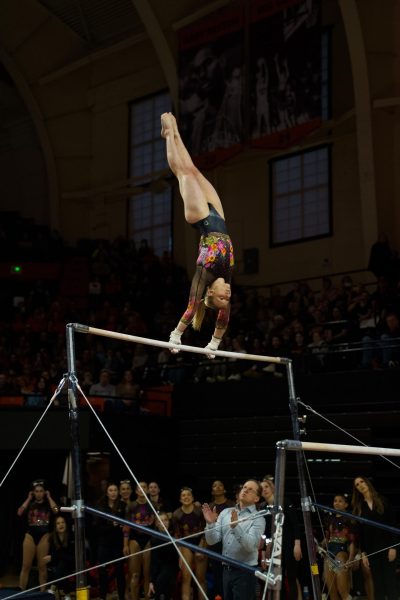OSU student rocket science podcast finds success at NASA event
Kyle Meaders (he/him) (left), JJ Colton (he/him) (middle), and Nathaniel Hannan (he/him) hosts of At Least It’s Not Rocket Science, get ready to record a podcast episode on May 1. at Oregon State University’s Orange Media Network podcast recording room in Corvallis. The hosts of the podcast At Least It’s Not Rocket Science recently went to Alabama for an event hosted by NASA, in which the podcasters launched a rocket that they had been working on for the past year.
May 9, 2023
A recent rocket launch hosted by NASA, and a podcast launch last November, both are the work of Oregon State University students through the “At Least It’s Not Rocket Science”.
Hosted in Toney, Alabama, the NASA Student Launch event sees students from across the nation bringing rockets of their own creation to launch in one large end of the school year event.
This year saw OSU students JJ Colton, Kyle Meaders, and Nathaniel Hannan, the hosts of “At Least It’s Not Rocket Science”, among others, attend the event, due to their links to OSU’s American Institute of Aeronautics and Astronautics team.
“It’s a capstone project, and so we do a yearly competition, and we drove down to Alabama to launch a rocket,” Colton, one of the podcast’s three hosts, said. “That’s kinda where the beginning of the project started.”
The podcast, which is available on streaming platforms such as Spotify and Apple podcasts, features the three student hosts discussing various topics surrounding the subject of aerospace engineering.
Most episodes feature a guest who is interviewed about their specialty. Other topics have included tips for engineering school, aliens, and highlights of specific projects in the engineering field. The podcast started in November of 2022, and has been uploading new episodes a few times every month.
“Each episode is unique in its own way,” said Hannan, one of the podcast hosts. “The thing that stands out would be the ability to interview different people with the same mindset of wanting to go out into aerospace, but in a different realm of aerospace … it opens up your perspective on everything. Maybe you’re more niched in one specific category, but then you listen to this other person and they talk about plasma propulsion, and it’s like, ‘Woah, I never even thought about that.’”
“At Least It’s Not Rocket Science” has been produced and published through Orange Media Networks KBVR-FM branch. The branch both handles OMN’s radio broadcasts on 88.7 FM, and the publishing of various podcasts.
“Something I really liked specifically about the At Least It’s Not Rocket Science guys is they came to me with their idea on this, and they kinda already knew what they were going to do, but they didn’t know how they were going to do it,” said Megan Vazquez, the podcast director at KBVR-FM.
According to Vazquez the group knew that they wanted to share information, and given the educational nature of KBVR-FM, this was something that could fit.
“Something different that they’re doing is taking something technical, and making it creative, and I’d really like to see more podcasters doing something like that,” Vazquez said.
Vazquez also shared the information that KBVR-FM is always open to prospective podcasters. There is no current upper limit on how many podcasts can be in production at once.
“We were thinking about passing it on to next year’s team, so it’ll be like a chair that next year’s (University Student Launch Initiative team) will fill all the roles and then do the podcast,” said Kyle Meaders, the third host on the future of the podcast. “We were talking about starting up our own similar podcast.”
The rocket launched without any problems in Alabama, and the podcast has gone strong with hours of content produced.
According to Meaders, the future of the podcast is unknown due to the team graduating this term but, this capstone project will definitely be one that endures.
“It was interesting to see and meet with the other teams and it’s like ‘Oh, this is real now,’” Meaders said. “It contextualizes a lot of what we were doing. We’re talking with these NASA members, and we got to talk to some NASA engineers and personnel and we got to talk to other engineers from other schools in other parts of the country … everything was worth it.”
Hannan said the experience of learning from those in the industry was impactful, and that having an opportunity to inspire others was a huge takeaway of the experience.
“The whole point of the podcast originally, of course it was for the STEM engagement requirement (for Student Launch), but even then it didn’t count towards it, so it was, for lack of a better term, we did it for the love of the game,” Colton said. “I just want to help inspire some people that are either in college, thinking about getting into college, or maybe they’re not thinking about doing college at all. Just to inspire people to do their best and try things that they are interested in.”












































































































